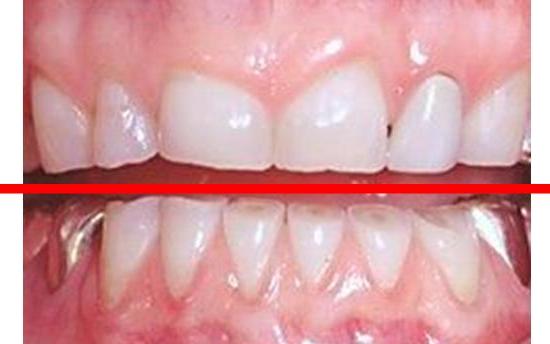Robert D. Follweiler D.D.S. P.A.
Periodontology and Laser Technology
901 East Ocean Boulevard Stuart , FL 34994
Bruxism (pronounced BRUK-sizm) is the term for grinding and clenching
of teeth. It usually happens at night,
during sleep, although some people clench and grind their teeth during the day.
People who suffer from bruxism may also bite their fingernails, chew on pencils
or bite the inside of their lips or cheeks. Children as well as adults suffer
from bruxism. Most children outgrow bruxism before they get their adult teeth.
Symptoms of bruxism may be: jaw or facial tenderness,
headaches or earaches, teeth that have become sensitive to cold or pressure,
indentations in the cheeks or tongue and tips of teeth that appear flattened.
Frequently a parent or sleep partner may be aware of the grinding even if the
person who is doing the grinding and clenching is unaware. Very often a dental
professional is responsible for notifying their patient that they are clenching
and grinding their teeth.
 Doctors do not completely understand the causes of
bruxism. In some adults abnormal tooth
alignment is thought to be the cause of bruxism. This is called malocclusion.
More often psychological factors
such as stress, anxiety and suppressed anger or frustration cause bruxism.
Aggressive, competitive or hyperactive personality types are also more likely
to clench and grind their teeth. Caffeine, nicotine and other drugs such as amphetamines
and cocaine increase the risk of bruxism. Bruxism may also be an uncommon side
effect of some psychiatric medications including antidepressants. In some cases
clenching and grinding isn’t caused by dental problems or stress but may be a complication
of other health problems such as Huntington’s disease or Parkinson’s
disease.
Doctors do not completely understand the causes of
bruxism. In some adults abnormal tooth
alignment is thought to be the cause of bruxism. This is called malocclusion.
More often psychological factors
such as stress, anxiety and suppressed anger or frustration cause bruxism.
Aggressive, competitive or hyperactive personality types are also more likely
to clench and grind their teeth. Caffeine, nicotine and other drugs such as amphetamines
and cocaine increase the risk of bruxism. Bruxism may also be an uncommon side
effect of some psychiatric medications including antidepressants. In some cases
clenching and grinding isn’t caused by dental problems or stress but may be a complication
of other health problems such as Huntington’s disease or Parkinson’s
disease.
So what can you do if you suspect you may be suffering from bruxism?
The first thing to do is to make an appointment with your dentist. Your dental
professional will exam your mouth for signs of bruxism such as unusual wear of your teeth, red and inflamed
tissues inside the mouth, broken dental restorations, tooth sensitivity, tender
jaw muscles and poor tooth alignment. X-rays
may be taken to see if the bruxism has damaged the underlying bone that
supports the teeth. Finally, your dentist will offer suggestions for treatment
such as adjusting your bite or fabricating a bite guard that can be worn to
protect your teeth from the nightly grind. There is more information available.

To learn more please
call our office or visit our web site – www.Follweilerperio.com

